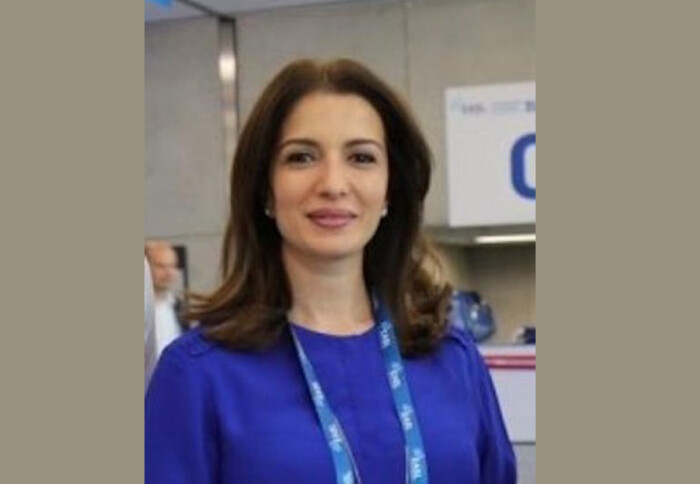Celebrating MDR's Women - Dr Wafa Khamri

To mark Women at Imperial Week, we interviewed three of MDR's outstanding female staff. In our second interview, we spoke to Dr Wafa Khamri.
Support for women throughout their career journey is critical to creating gender equality in the workplace. To understand the experiences, support and issues women may face as they progress through their careers, we spoke with three MDR staff members, each from a different part of the Department, about their career journey.
Dr Wafa Khamri, Senior Teaching Fellow in the Section of Hepatology and Gastroenterology
Tell us a bit about your career, background, and current role

I initially trained as a research scientist, my area of expertise is to study the human immune system and its interactions with pathogens in both health and disease. Specifically, I focus on dissecting mechanisms responsible for dysfunctional immune responses, causing patients with acute and chronic liver disease complications to have difficulty controlling infections. My research has identified critical molecular and cellular drivers that induce and propagate immunosuppression in these patients, with the goal of finding immunotherapy-based strategies to improve patient outcomes. Over the course of my career, I have always valued the synergy between research and education. As I progressed, I found myself transitioning towards a more teaching-focused, student-centred role in the School of Medicine, prioritising innovation and tangible contributions to enhance the learning experience and support medical students during their MBBS degree. This path has given me a renewed sense of purpose and creativity; every day, I am motivated by the opportunity to make a difference in the student experience in my roles as course lead for the intercalated BSc Gastroenterology & Hepatology and as Head of Academic Tutoring Phase 2 on the MBBS/BSc medical programme.
Can you share a time when you felt supported in your career journey by a colleague or mentor?
It was only when I began asking myself the right questions that I found a network of support within and beyond my department, providing me with all the necessary resources to move forward. Dr Wafa Khamri
As researchers, we often become so engrossed in our passion for research that we lose sight of how it relates to our career trajectory. Someone once told me: “If only scientists planned their careers the same way they plan their experiments”. However, the isolation and invisibility that come with experimental research can make career planning a challenge. It was only when I began asking myself the right questions that I found a network of support within and beyond my department, providing me with all the necessary resources to move forward.
What has been the proudest achievement of your career so far?
In research, every publication I have made holds significance to me. Each paper represents a unique journey of growth, passion for research, shared moments of discovery, collaborations, setbacks, changes of direction, and most importantly the contributions of my undergraduate and postgraduate clinical and non-clinical students. As an educator, it brings me great joy to witness my students' growth during their journey towards independence as they acquire new skill sets and personal attributes.
Have you ever experienced imposter syndrome or self-doubt in your career? How did you overcome it, and what support did you find helpful?

Doubt is an integral component of the learning process and it should be embraced and welcomed as it often creates valuable opportunities for growth. I use these opportunities to identify what I need to change or improve and focus my time and energy on that. I transform my self-doubt into more empowering self-talk by engaging in self-reflection to realign with my aspirations and goals. I no longer avoid taking risks or hold back from making decisions. After all, some of the greatest discoveries are the result of what was initially considered a mistake!
What role can people in senior positions play in supporting and advocating for women's career advancement and equality in the workplace?
We cannot reach our destination if we don’t know where we are going! Not all careers have a well-defined structure. Being clear on our strengths and vulnerabilities is essential, but the quality of our decisions largely depends on the clarity of the available options. It is, therefore, essential to encourage open conversations where realistic, timely options can be discussed, even if this means changing direction. In fact, taking a different step can be the most rewarding move one can make!
What advice would you give to women who are just starting their careers, based on your own experiences?
It is critical to align your actions with your goals and your work with your career. This means knowing the necessary steps required to reach your destination. Explore all options available to you before making informed decisions. Seek diverse perspectives and input from colleagues within and outside your field and use all available resources within your reach. Have confidence in yourself and your abilities. Don’t hesitate to share your ideas and work, even if they are “not perfect”; perfection is unattainable, and early feedback from others can help you improve and focus on what is important. Remember that this is an exciting journey of growth; celebrate your successes, big or small, with gratitude and keep working on your self-development and well-being. Lastly, accept that your priorities may shift over time, so be adaptable and embrace change, follow your passion and prioritise what matters most to you. “We must have perseverance and above all confidence in ourselves. We must believe that we are gifted for something and that this thing must be attained”- Marie Curie
Article text (excluding photos or graphics) © Imperial College London.
Photos and graphics subject to third party copyright used with permission or © Imperial College London.
Reporter
Benjie Coleman
Department of Surgery & Cancer